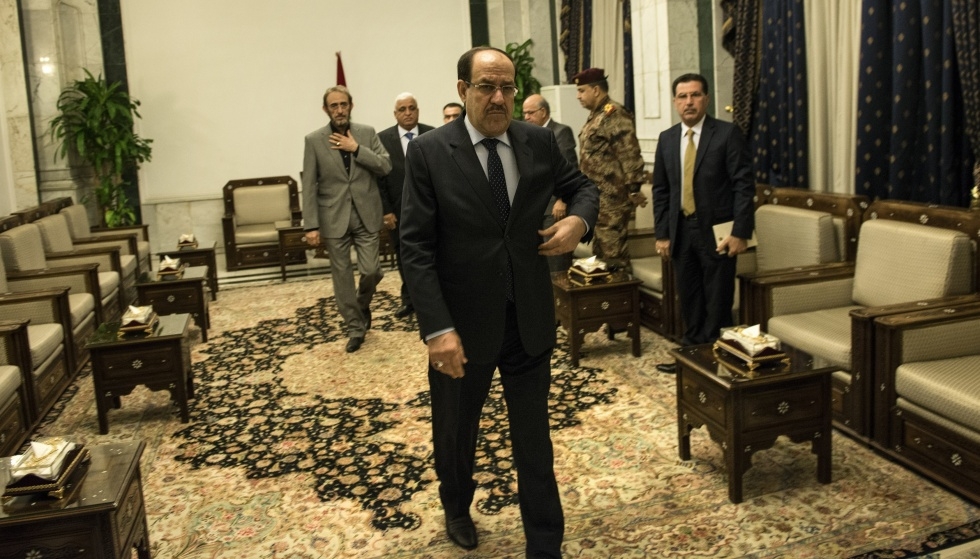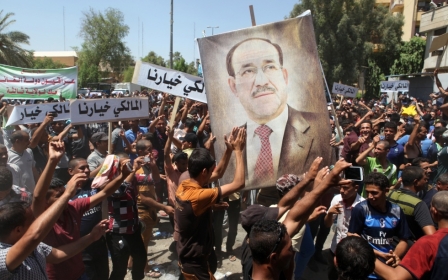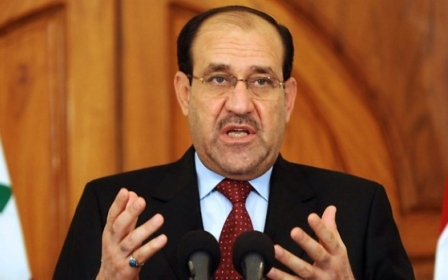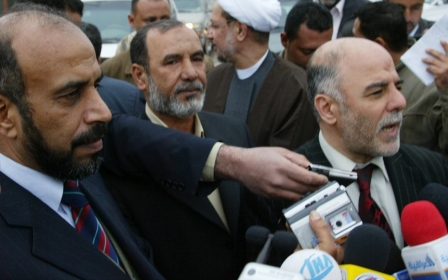Fears of further Iraq split despite new PM nomination

Despite an international welcome for the nomination of Haidar al-Abadi as Iraq's next prime minister to replace incumbent Nuri al-Maliki, analysts fear that the war-torn country has not sailed out of troubled waters yet.
The United States, Iran and Saudi Arabia have all welcomed the tasking of Abadi to form government instead of Maliki.
But Maliki, who has been at the head of government in Iraq since 2006, has rejected his replacement as unconstitutional and vowed to take legal action against the country's new president Fuad Masum, who tasked Abadi on Monday with forming a government.
Abadi has a month to form a new government approved by parliament. Until then, Maliki will remain caretaker premier.
But some observers fear that Maliki's refusal to leave office will likely cause a further split in a country already riddled with division.
"Maliki is using a scorched earth policy when refusing to step aside and allow a new government be formed," Sabah al-Mokhtar, an Iraqi-born observer who heads the Arab Lawyers Association in London, told MEE.
"He is willing to drag the country into further chaos rather than let go of power," Mokhtar said.
Maliki's coalition won the largest number of seats in the parliamentary elections in April, which were boycotted by many of the country's Sunni Arabs, but he failed to secure a majority to form a government.
But Mokhtar stressed that the country's troubles will not simply vanish with the replacement of Maliki.
"Abadi still faces a lot of problems, including forming a cabinet that pleases all parties. This is unlikely to happen anytime time soon. Nor is the resolution of the security situation," he said.
Constitutional crisis
Some observers argue that Maliki should have been allowed to try to form a government, as his bloc secured the largest number of votes.
"The appointment of Abadi has further complicated an already complicated matter," said Sadiq Altaai, a London-based Iraqi analyst.
"The president has just tasked an unregistered bloc, whose number of seats is unknown, with forming government. This is unconstitutional," he added.
"Constitutionally, Maliki should have been allowed to try to form a government. That way, if he fails to win parliament's approval, the task would go to someone else without any constitutional irregularities," explained Altaai.
However, the question of the legitimacy of government has remained a thorny issue since the 2003 US-led invasion, with many – but not all - Sunni Arabs questioning the legality of the whole political process, including the country's constitution.
"The reason Maliki said he would sue the president is because he has a loyal ally in the judiciary that has frequently backed him. He is counting on the support of Medhat al-Mahmoud, the head of the Iraqi Supreme Judicial Council and Chief Justice of Iraq," said Mokhtar.
"In 2001, following electoral victory of the Iraqiya coalition [headed by former premier Ayad Alawi, who won most votes but still fell short of outright majority], Medhat al-Mahmoud ruled in favour of Maliki's coalition [which came second], arguing that having the most votes is not enough to attempt forming government," said Mokhtar.
"But in 2014, Medhat al-Mahmoud has ruled the exact opposite, siding with Maliki no what the situation is," added Mokhtar.
"Medhat al-Mahmoud is the last remaining official appointed by [former US Presidential Envoy to Iraq and head of Iraq's Coalition Provisional Authority in 2004] Paul Bremer," said Mokhtar, pointing the finger to a lingering American influence that, coupled with Iranian meddling, has further divided Iraq.
However, there are many others who have accepted the new political landscape in Iraq yet are still unhappy with Maliki's policies, not least of which the Kurds, the Sadarists and more recently followers of the Islamic Supreme Council headed by Ammar al-Hakim – all of which are very influential players in today's Iraq.
This is in addition to the discontent of Iraq's Sunni Arabs, including both those who are part of the political process and others who have resorted to arms or even terror.
Divided army?
It is still unclear, however, whether the nomination of Abadi will ease the country's tensions as the new premier will still have to face old as well as new crises.
"Maliki had directly appointed many officials in the army and the security forces, whose loyalties are to him personally, so if they too refuse the new premier than we could see a split in the army," warned Altaai.
In a statement on Maliki's website on Tuesday, the premier called on the security forces "to stay away from the political crisis and continue in their security and military duties to defend the country", but many remain unassured.
"There is a serious threat of infighting; if the new premier, who is also supposed to be the commander of the armed forces, has no control of the army," said Altaai, adding that this would spell disaster given the security situation with the militant onslaught in many areas in Iraq.
"Until now we have no real knowledge of what has happened in Mosul and other cities. The military commanders who fled in the face of the advancing militants remain in charge. How will this army be able to fight the militants if it becomes further divided?" Asked Altaai.
The security situation is further aggravated in the Kurdish controlled areas in Iraq's north.
"The Kurdish Peshmerga forces are now in possession of the armoured vehicles and helicopters left behind by the fleeing Iraqi army. On top of that, the Americans are now also arming the Kurds [to fight Islamic State militants] in a reversal of an earlier policy which stated that arms to Kurdistan must go through the Baghdad government. The European Union will also join in the arming of Kurds," noted Altaai.
"But the implication of this goes beyond the current fighting [against IS]; it will lead to a new split within the exiting split – sowing the seeds for a possible war between a better armed Kurdish force and the Iraqi army over the territories that have recently become under Peshmerga control," added Altaai.
Such additional infighting would inevitably delay finding a consensus to tackling the brutal threat of IS.
"There are many catastrophes which could take place [carried out by IS militants], like the destruction of the dams of Mosul and Haditha, which would cause gigantic floods that would reach the gates of Baghdad, threatening millions of people," he warned.
"All of these conflicts have meant that the average Iraqi will continue to suffer", said Alttai.
Multifaceted terror
This sentiment is also shared by Mokhtar, who added that Iraqis face multifaceted terror.
"When American officials talk of terror in Iraq, they almost exclusively refer to IS. But there are many other terrorist groups on the ground that the West does not care to mention. They include the Iranian-backed Asaib Ahl al-Haq [League of the Righteous] and other militias that are not related to al-Qaeda," stressed Mokhtar.
"You cannot defeat terrorism with bombardment from the air," said Mokhtar, who believes the solution requires a political intervention that also includes the dismantling of pro-government militias, among other things.
Without addressing the grievances of Iraq's Sunni Arabs, there can be no permanent solution to the crisis in Iraq, argues Mokhtar, adding that although the situation has been made worse by Maliki, removing him will not be enough.
He said the majority of militants who forced out the Iraqi army in Sunni Arab-majority areas are not members of IS.
"The Military Council in Iraq has tens of thousands of fighters while IS has have two to six thousands maximum. But IS militants are more suicidal and more vocal," said Mokhtar.
The Military Council makes up the bulk of a Sunni insurgency that is not linked to al-Qaeda, but includes former members of the Iraqi army before being dismantled following the 2003 US-led invasion, as well as Baathists and loyalists to the regime of Saddam Hussein.
There is a temporary marriage of convenience in order to get rid of what Mokhtar described as a sectarian government, that is accused of engaging in wide scale torture, rape and murder of Sunni Arabs.
But while some of the supporters of the Military Council are Iraqis with legitimate grievances, there are many other backers who are sectarian themselves and would not accept a Shiite-led government under any circumstances.
Syria scenario
The senseless violence in Iraq, which has not spared the Shiite community, has led both sides of the sectarian divide to adopt a less tolerant stance towards the other.
And it is this atmosphere that has allowed the brutal acts of IS go unpunished.
"Sunni Arab fighters, who are no fans of IS, will not engage with fighting with them while being in the same trenches against [post-2004] the regime," said Mokhtar.
"They do not plan to punish [IS] criminals in the battlefield, repeating the same mistake in Syria," he added.
"The rebels in Syria were engaged in fighting with IS militants, which was a distraction from the war with the worse enemy - the regime of president Bashar al-Assad," said Mokhtar, stressing that Iraq's Sunni Arab fighters want to avoid making that mistake, given the choice.
"The Iraqi Sahwa [Awakening, anti-Qadea] fighters have previously fought the likes of IS, and all Iraqis – including Sunnis – have been victims of al-Qaeda. But for now, their battle is against a far worse enemy [the Iraqi government]," said Mokhtar, adding that once that war is won there will be a new reality on the ground that won't allow for the existence of IS in Iraq.
But it is uncertain how much more can Sunni Arabs put up with the destructive as well as bloody actions of IS militants, whether against the country's holy sites or citizens from all backgrounds, not least its minorities.
"There are already small clashes [between IS militants and Sunni Arabs] in Mosul. There is no doubt that the bigger fight is coming," said Altaai.
New MEE newsletter: Jerusalem Dispatch
Sign up to get the latest insights and analysis on Israel-Palestine, alongside Turkey Unpacked and other MEE newsletters
Middle East Eye delivers independent and unrivalled coverage and analysis of the Middle East, North Africa and beyond. To learn more about republishing this content and the associated fees, please fill out this form. More about MEE can be found here.




